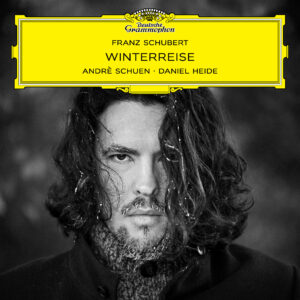Winterreise on DG (CD Review)
Franz Schubert – Winterreise
André Schuen, baritone and Daniel Heide, piano
Deutsche Grammophon
Winterreise is the third recording of Schubert’s cycles/song sets (Schwanengesang isn’t a cycle – it has multiple poets) by baritone André Schuen and pianist Daniel Heide. These were some of the last pieces written by Franz Schubert (1797 – 1828), and he sang them at the piano to console himself about worsening health (syphilis likely contributed to his early demise). Of the three, Winterreise is the best suited to Schuen’s voice, a full lyric baritone. The recordings of Die Schöne Müllerin and Schwanengesang are excellent, but his mature sound and the dramatic interpretations Schuen adopts are ideal for the pathos of Winterreise. He captures the narrator’s vacillating inner monologue with declamation ranging from delicate pianissimo singing to roaring rage. Heide has collaborated with a number of singers and instrumentalists, but his work with Schuen is among his best partnerships. He plays with nuance and a fluid sense of the rhythmic component of the piece. The latter affords Schuen room for small fluctuations in tempo to emphasize particular words.
From the tramping outside his former girlfriend’s door in “Gute Nacht” onward, the tempos are well-considered, never languid even in the most tragic songs. Instead, the duo treats the winter’s journey taken by the narrator as inexorable, a quest without a prize. Along that line, the mystery of the cycle is how it ends, with the song Die Leiermann (the organ-grinder): Who is the organ-grinder? Is he real? A symbol of death? Or the final delusion of the protagonist as he succumbs to the elements? The duo perform the song understatedly, in such a way as to leave the enigma of these questions intact. Winterreise appears on a number of excellent recordings – here is one more.
Christian Carey
